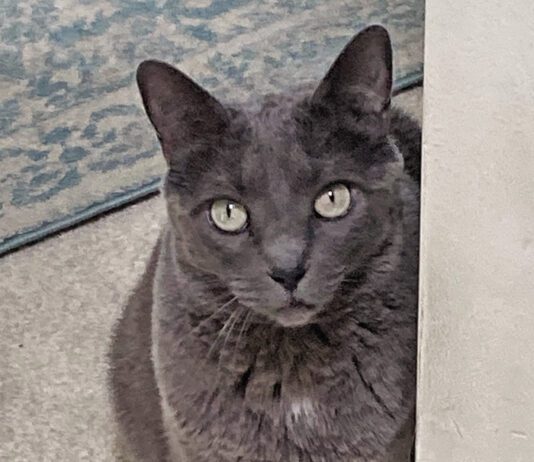Neither a Smile, Nor a Grimace
If your cat curls his top lip and inhales, he may look as if hes smiling or even grimacing, but hes actually sniffing out odors. The behavior, called the flehmen response, is particular to mammals, such as members of the cat family, horses, cattle and pigs.
Ask Elizabeth: March 2015
Q. Ive been feeding a neutered male outdoor cat for the past few weeks, and he is aggressively friendly. On two occasions, he attacked my legs with his claws when I was walking to his food bowl to fill it. I began taking a spray bottle with me and squirted him when he got too close but stopped that because I thought it would only confuse him. Lately, he has not attacked me but is still very persistent in rubbing against me to the point of almost causing me to trip. Is there anything I can do to calm him down before mealtime?
Ask Elizabeth: February 2015
Q. I have a 13-year-old domestic shorthaired cat who has recently developed an annoying habit over the past six months. He has begun meowing incessantly to the extent that he is driving our family crazy. We cant tell if he is unhappy or sick, although he does not appear to be outwardly ill. This behavior keeps us up at night sometimes, and his daytime meowing has become hard to handle. Do you have any ideas about what may be going on?
Unlike Adults Battling Over Resources, Kittens Learn the Limits of Roughness
As engaging as kittens play fighting is - and hours of YouTube can attest to it - the behavior serves a serious purpose. Thats how kittens learn to stalk, to hunt and how rough to be, or not to be, with people and each other, says animal behaviorist Tracy Kroll, DVM. Kittens learn from each other what hurts.The challenge for owners is determining when to intervene in unbridled chases, leaps and attacks. If one kitten is no longer enjoying the play behavior and is hissing and trying to escape, he wants the game to be over, Dr. Kroll says. With young cats, each has a time limit for games.
The Best Way to Break Up a Catfight
Most catfights occur between two females, followed by two males rather than male to female. The causes vary but most often center on coveted boundaries and possessions, with vertical spaces like climbing trees and sturdy shelves being especially valued.Whatever the reason, the safest way to break up a fight is the same: Keep your hands off both combatants. Instead, intervene with a disruption or barrier. Drop a pot on the floor, wedge a rigid, flat object like a baking sheet between them or pop an empty cardboard box over one of them.Protecting yourself is paramount because cats have an arsenal of sharp teeth and claws. When paired with their flexible spines and acrobatic ability, they can cause serious puncture wounds. If the wounds become infected, you can land in the hospital with cat scratch fever, an infection caused by the bacteria Bartonella henselae, found in cat saliva. People with compromised immune systems are at the greatest risk for the infection.
How Outwit Your Wily Escape Artist
You open the door for an unexpected visitor and your cat flees. Its frustrating for you, potentially dangerous for your escape artist - and a possible sign that its time to add stimulation to his daily life.Cats adopted from a shelter may have been free roaming, with wide territories to explore, play and hide in. Now theyre confined at home to keep them safe from speeding cars and potential fights with stray cats and wildlife that can maim or kill, says Tracy Kroll, DVM, an animal behaviorist in Fair Lawn, N.J.
The Many Reasons for the Cats Meow
Meowing can be endearing, but lets face it: When our cats meow to excess, it can sometimes drive us crazy. The same sort of meowing that is not a problem at 6 p.m. can be a huge problem at 4 a.m. when the owner is trying to sleep, says behaviorist Katherine A. Houpt, VMD, Ph.D., professor emeritus at Cornell University College of Veterinary Medicine. What cat owners consider excessive meowing in cats depends largely on what time of day it is.
Why Do They … Like to Hide?
They lie in wait around corners, ready to pounce on your ankles. They hunker in the outer reaches of closets, eyes gleaming in semi-darkness, or they stake out favored spots under the bed, in the clothes dryer, and in bags, boxes, mattresses and easy chairs.
House Soiling’s Causes and Solutions
If you have a cat who fails to use the litter box consistently, you may want to alert his veterinarian to a new set of guidelines for preventing and treating the problem.
Why Do They Like to Hide?
They lie in wait around corners, ready to pounce on your ankles. They hunker in the outer reaches of closets, eyes gleaming in semi-darkness, or they stake out favored spots under the bed, in the clothes dryer, and in bags, boxes, mattresses and easy chairs.
House Soilings Causes and Solutions
If you have a cat who fails to use the litter box consistently, you may want to alert his veterinarian to a new set of guidelines for preventing and treating the problem.
When Play Biting Turns Aggressive
You may have been amused when your kitten or newly adopted cat first playfully pounced on your ankles or delivered love nips to your hand. But now, his swatting and biting have intensified, leaving you with deep scratches and broken skin.














